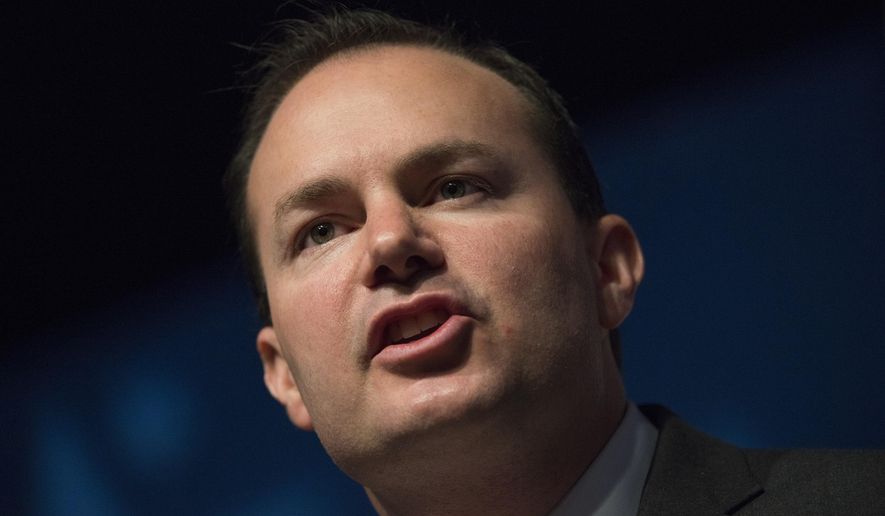More than half of the current U.S. Senate has used campaign contributions for their own self-enrichment and/or to bolster the family bank accounts, according to a new watchdog report released Tuesday.
Citizens for Responsibility and Ethics in Washington found at least 67 senators have used their position in Congress to benefit themselves and their family members, paying their relatives a total of $1.3 million in salaries and fees and paying family businesses employers or associated nonprofits nearly $2.6 million between 2008 and 2014.
“Senators’ salaries are several times that of the average American, yet some find ways to further line their pockets,” said CREW Executive Director Melanie Sloan. “The Senate may be gridlocked when it comes to conducting the people’s business, but for family members enjoying the perks of being related to a senator, it’s business as usual.”
According to the report, 19 senators, including five Democrats, one Independent and 13 Republicans, paid family members through their campaign or political action committees.
Sen. Mike Lee, Utah Republican, rang up the highest tab, with $258,556 in salary being paid over several years to Benjamin James Burr, who is his wife’s nephew.
But Lee spokesman Brian Phillips said CREW had misreported information and condemned the group’s report. He pointed out that Senate ethics rules specifically do not cover payments to nieces and nephews who are only related by marriage.
“We have been completely above board on all of this,” Mr. Phillips said. “This instance should not be included in this report. We are in line with the Senate ethics manual.”
Twenty-six senators (12 Democrats and 14 Republicans) have paid a family business, employer or associated nonprofit.
Sen. Rand Paul, Kentucky Republican and possible 2016 GOP contender, paid Jesse Benton, his niece’s husband, $172,417 in salary for several years of work as a political strategy consultant, according to CREW. Mr. Paul and his leadership PAC also paid a combined $4.8 million to a media production company for which Mr. Paul’s wife Kelley worked as a consultant.
In an email to The Washington Times, Paul spokesman Sergio Gor called CREW’s report “false and inaccurate,” adding that Mr. Benton has not been on any payroll connected to Mr. Paul in more than three years.
“The numbers in the report are inflated because one of the companies compensated spent large amounts of cash on media buys, not compensation,” added Brian Darling, senior communications director for Mr. Paul.
Another seven senators have contributed funds from their own campaigns to help pay for a family member’s campaign, including Mr. Paul, who contributed $7,100 to his father Ron Paul’s presidential campaigns. Sen. Mary L. Landrieu, Louisiana Democrat, contributed $15,000 to brother Mitch Landrieu’s campaigns for New Orleans mayor.
“Given the low approval rating of Congress, any time politicians are seen as using public office for personal gain, it’s very damaging and dangerous for public democracy,” said Meredith McGehee, public policy director at the Campaign Legal Center.
According to Ms. McGehee, senators engaging in self-dealing practices may be mentally harkening back to a time when families always worked and earned together.
“I don’t think it serves the process well, because the members and candidates are the last people to even understand their own motives,” she said. “You hear members of Congress come back and say, ’When I first started, I was running my campaign out of my garage, and my sister-in-law was doing the bookkeeping.’”
It’s not just money that blurs the lines between senators and their family members, but also political influence. Thirty senators have one or more family members who have been registered to lobby or are employed in government affairs.
In the Senate, Sen. Chuck Grassley, Iowa Republican, has the most family members employed in government affairs, with five. Sen. Roy Blunt, Missouri Republican, and Sen. Pat Roberts, Kansas Republican, each have four family members who have been registered to lobby or who are employed in government affairs.
“It does facilitate access,” Ms. McGehee said. “Once you’re elected, then your family, in my view, should not be in the business of lobbying.”
But Amber Marchand, a spokeswoman for Mr. Blunt, noted that his son, Andy, only lobbies in the state of Missouri and is not federally registered, while his wife, Abigail, only lobbies in the House.
Four bills have already been proposed in Congress that include provisions to prevent members of Congress from converting funds for personal use.
But according to Ms. McGehee, other steps can be taken to prevent Congress members from using campaign money for personal gain.
“The first thing that could be done would be to revise the personal use rules to cover self-dealing transactions,” Ms. McGehee said. “That would not necessarily require congressional actions, and it would cover a multitude of sins.”
• Kellan Howell can be reached at khowell@washingtontimes.com.




Please read our comment policy before commenting.